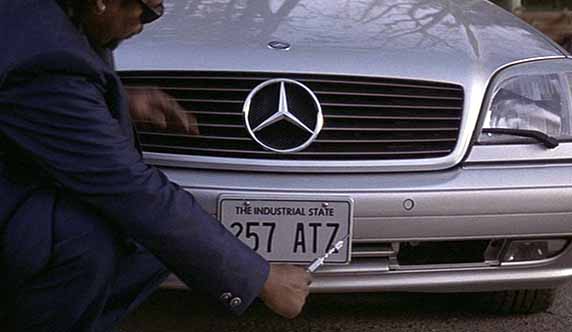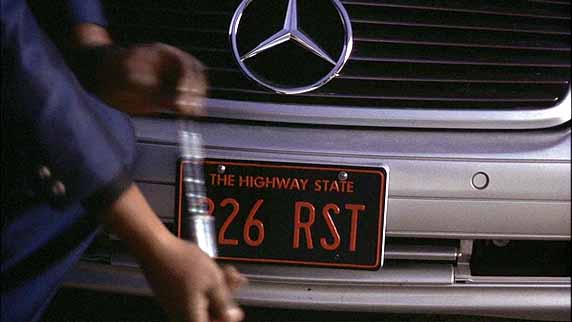

DVD captures from Jim Jarmusch's Ghost Dog: The Way of the Samurai (1999). In the top frame Ghost Dog removes a license plate from a car he has just stolen and in the bottom, replaces it with a plate from some unsuspecting picnickers. I saw the movie twice before noticing the deadpan mottos for nonexistent states. The music is by Wu-Tang Clan guiding light The RZA, who is featured in cameo (and camo) near the end of the film as a fellow urban samurai. The RZA, who also did the Kill Bill score, is the subject of a wild interview over at the Onion AV Club. Amazing that music so heavenly could come from such a down-and-dirty talker. (O: What was ODB like before the Wu-Tang Clan? RZA: He was similar, without the money and without the name. I've been involved in a lot of things in my life, and I'd always count him in. Like if I wanted to see some girls, I'd call him and say, "Yo, I've got these girls. These girls are going to steal some shit for us, and all we have to do is hang out with them, spit right with 'em, fuck 'em, and then they'll do that for us." He'd come over, and then the next day, the girls would be ready, and he'd do something to fuck up the whole shit, or get the dough and spend it in one day, or something that's real fucked-up. Like if he got hold of a car, he'd crash it. He was always like that.) The Ghost Dog score is a strangely heart-tugging melange of hiphop beats, Asian temple chimes, industrial ka-chings & whirs and wispy, pretty recurring melodies. According to the DVD notes, RZA assigned the film's characters their own musical motifs a la Peter and the Wolf. Well, I'm damned if I find any relationship, but each motif is heard exactly when it's needed. The music, working in tandem with Jarmusch's entranced views of the city and frequent close-ups of Forrest Whitaker's sad face, creates an elegiac mood so powerful that it survives even the director's characteristic outbreaks of weird humor and inexplicable behavior (e.g., the old mafia guy suddenly yelling "passenger pigeon! passenger pigeon's been extinct since 1914!"). To hear the score properly you need to get the DVD, because the CD soundtrack is mostly songs by other artists, apparently (or get the Japanese version of the soundtrack for $44).
Whether or not you like Ghost Dog, I recommend this Roger Ebert review: he's done a great job of thinking past the various facades of the movie; it really changed the way I looked at it.
That is a good review. It's true what he says, the fact of the extreme oddity of the story somehow passed me by and I just didn't "get" it. Too many John Woo pigeons? Too many gangster spoofs? So many movies look exactly like one another...Jarmusch didn't give us many visual clues that he was hitting the tropes on purpose. And I'm assuming the invisibilty of that self-conscious stance is intentional. Which is interesting in and of itself, but still left me feeling bored during the film.
To each our own boredom. ("Boredom" is kind of a signature of Jarmusch movies, isn't it?) We disagree over whether Ghost Dog looks like other movies, though. The cinematography, editing, and especially the music all shine. GD doesn't just walk across a rooftop, he timehops in multiple dissolves. In Woo, the guy with the red flag controlling the pigeons is offscreen; here he's the main character. Visual cues: all the gangsters watch vintage cartoons (Felix the Cat, Woody Woodpecker), most of them violent. The "drainpipe murder" is anticipated in the cartoon that precedes it. The scene where the mafiosi "retainer" saves the young Ghost Dog is different each time it's shown, depending on who's remembering it. (And the two book-reading female characters are both reading Rashomon.) At the end, you know the boss's daughter has assumed control because the (unseen) driver won't move the car until she commands him. That's pretty subtle. Audial cues to trope crossover: the Italian gangster who can sing Flavor Flav lyrics word for word (hilarious). Casting RZA as a fellow Samurai: Ghost Dog may be insane, but the film suggests there's an underground of other Ghost Dogs, and that they are known and respected in the community. Eerie.
https://continent-telecom.com/virtual-number-germany
https://athens-rentalcars.com/pt/
Here so history!
It has surprised me.
Willingly I accept. In my opinion, it is actual, I will take part in discussion. I know, that together we can come to a right answer.
I am sorry, that I interfere, but it is necessary for me little bit more information.
You have hit the mark. In it something is also to me it seems it is very good idea. Completely with you I will agree.
Your idea is very good
I apologise, but, in my opinion, you are not right. I am assured. I suggest it to discuss. Write to me in PM, we will talk.
https://www.adsoftheworld.com/users/a65a0ec4-7c22-4be2-96d6-39c926efa0cc
https://winnita-promocode.com/
https://dissertation-now.com/research-paper/
|
DVD captures from Jim Jarmusch's Ghost Dog: The Way of the Samurai (1999). In the top frame Ghost Dog removes a license plate from a car he has just stolen and in the bottom, replaces it with a plate from some unsuspecting picnickers. I saw the movie twice before noticing the deadpan mottos for nonexistent states. The music is by Wu-Tang Clan guiding light The RZA, who is featured in cameo (and camo) near the end of the film as a fellow urban samurai. The RZA, who also did the Kill Bill score, is the subject of a wild interview over at the Onion AV Club. Amazing that music so heavenly could come from such a down-and-dirty talker.
(O: What was ODB like before the Wu-Tang Clan? RZA: He was similar, without the money and without the name. I've been involved in a lot of things in my life, and I'd always count him in. Like if I wanted to see some girls, I'd call him and say, "Yo, I've got these girls. These girls are going to steal some shit for us, and all we have to do is hang out with them, spit right with 'em, fuck 'em, and then they'll do that for us." He'd come over, and then the next day, the girls would be ready, and he'd do something to fuck up the whole shit, or get the dough and spend it in one day, or something that's real fucked-up. Like if he got hold of a car, he'd crash it. He was always like that.)
The Ghost Dog score is a strangely heart-tugging melange of hiphop beats, Asian temple chimes, industrial ka-chings & whirs and wispy, pretty recurring melodies. According to the DVD notes, RZA assigned the film's characters their own musical motifs a la Peter and the Wolf. Well, I'm damned if I find any relationship, but each motif is heard exactly when it's needed. The music, working in tandem with Jarmusch's entranced views of the city and frequent close-ups of Forrest Whitaker's sad face, creates an elegiac mood so powerful that it survives even the director's characteristic outbreaks of weird humor and inexplicable behavior (e.g., the old mafia guy suddenly yelling "passenger pigeon! passenger pigeon's been extinct since 1914!"). To hear the score properly you need to get the DVD, because the CD soundtrack is mostly songs by other artists, apparently (or get the Japanese version of the soundtrack for $44).
- tom moody 12-02-2003 8:36 pm
Whether or not you like Ghost Dog, I recommend this Roger Ebert review: he's done a great job of thinking past the various facades of the movie; it really changed the way I looked at it.
- tom moody 12-28-2003 10:34 pm
That is a good review. It's true what he says, the fact of the extreme oddity of the story somehow passed me by and I just didn't "get" it. Too many John Woo pigeons? Too many gangster spoofs? So many movies look exactly like one another...Jarmusch didn't give us many visual clues that he was hitting the tropes on purpose. And I'm assuming the invisibilty of that self-conscious stance is intentional. Which is interesting in and of itself, but still left me feeling bored during the film.
- sally mckay 12-29-2003 7:02 pm
To each our own boredom. ("Boredom" is kind of a signature of Jarmusch movies, isn't it?) We disagree over whether Ghost Dog looks like other movies, though. The cinematography, editing, and especially the music all shine. GD doesn't just walk across a rooftop, he timehops in multiple dissolves. In Woo, the guy with the red flag controlling the pigeons is offscreen; here he's the main character. Visual cues: all the gangsters watch vintage cartoons (Felix the Cat, Woody Woodpecker), most of them violent. The "drainpipe murder" is anticipated in the cartoon that precedes it. The scene where the mafiosi "retainer" saves the young Ghost Dog is different each time it's shown, depending on who's remembering it. (And the two book-reading female characters are both reading Rashomon.) At the end, you know the boss's daughter has assumed control because the (unseen) driver won't move the car until she commands him. That's pretty subtle. Audial cues to trope crossover: the Italian gangster who can sing Flavor Flav lyrics word for word (hilarious). Casting RZA as a fellow Samurai: Ghost Dog may be insane, but the film suggests there's an underground of other Ghost Dogs, and that they are known and respected in the community. Eerie.
- tom moody 12-29-2003 7:47 pm
https://continent-telecom.com/virtual-number-germany
- Joshuamow (guest) 1-25-2025 4:26 pm
https://athens-rentalcars.com/pt/
- ThomasSow (guest) 1-26-2025 6:48 pm
Here so history!
- betcha casino (guest) 1-28-2025 7:49 am
It has surprised me.
- 1xbet india (guest) 1-30-2025 6:56 am
Willingly I accept. In my opinion, it is actual, I will take part in discussion. I know, that together we can come to a right answer.
- 20 betting (guest) 1-31-2025 11:36 pm
I am sorry, that I interfere, but it is necessary for me little bit more information.
- avenue18 (guest) 2-02-2025 4:59 pm
You have hit the mark. In it something is also to me it seems it is very good idea. Completely with you I will agree.
- 1xcasinouz (guest) 2-11-2025 5:15 pm
Your idea is very good
- melbetbdofficial (guest) 2-12-2025 7:50 pm
I apologise, but, in my opinion, you are not right. I am assured. I suggest it to discuss. Write to me in PM, we will talk.
- 1x-bet-india (guest) 2-20-2025 5:16 am
https://www.adsoftheworld.com/users/a65a0ec4-7c22-4be2-96d6-39c926efa0cc
- WilliamDiask (guest) 2-25-2025 7:03 am
https://winnita-promocode.com/
- RickeyHek (guest) 3-13-2025 7:14 pm
https://dissertation-now.com/research-paper/
- ElliottBroah (guest) 3-29-2025 6:03 pm